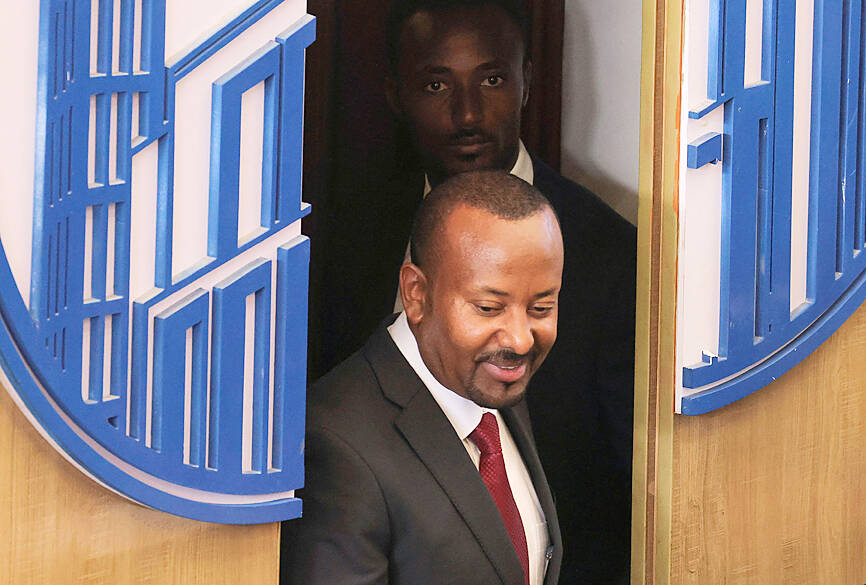Journalists are facing raids and terrorism charges in Ethiopia as the media denounces a renewed “climate of fear” ahead of elections next year. There had been hopes for greater press freedom after Ethiopian Prime Minister Abiy Ahmed took power in 2018, with exiled journalists encouraged to return.
However, a brutal war in the Tigray region from 2020 to 2022, and ongoing insurgencies in the Amhara and Oromia regions have led to those freedoms being once again harshly curtailed.
Last month, three employees of Addis Standard, an online newspaper, were detained for several hours for unknown reasons following a police raid on their offices. Six laptops and eight phones were seized and have still not been returned.

Photo: Reuters
In March, seven journalists from the private Ethiopian Broadcasting Service were arrested in a terrorism investigation after the broadcast of a documentary in which a woman claimed to have been raped by men in military uniform. The woman later retracted her statements and the station apologized, but that was not accepted by the authorities.
On April 23, a journalist for The Reporter newspaper, who was investigating the grievances of dismissed former military personnel seeking financial compensation, was arrested.
Last month also saw parliament pass an amendment to the press freedom law, putting oversight powers in the hands of the prime minister’s office rather than the semi-independent media association.
“The current situation for journalists in Ethiopia is more dire than ever,” said Tesfa, a journalist who has worked in the east African country for 10 years. Like other journalists interviewed by AFP, he gave a false name for fear of repercussions by the security agencies, describing a widespread “climate of fear”.
After the Addis Standard raid, Admasu, who works for a private media outlet, said he deleted messages on WhatsApp and social media.
“I realized it was time to think twice before doing anything that might land me in jail for no reason,” he said.
On Saturday last week, World Press Freedom Day, 14 diplomatic missions in Ethiopia, including the UK, Belgium and France, issued a statement deploring the fact that “freedom of expression continues to be subject to significant pressure.”
Some of the toughest restrictions are around access to Oromia and Amhara, the insurgency-hit regions that are Ethiopia’s most populous, with more than 60 million people between them.
Millions of children are deprived of schooling, and hundreds of thousands of people have been displaced by the violence, but reporters are rarely granted access.
France-based media watchdog Reporters Without Borders (RSF) put Ethiopia 145th out of 180 countries in its latest press freedom ranking.
Abiy, who won the Nobel Peace Prize in 2019 for his temporary rapprochement with neighboring Eritrea, had opened up the media space for a while, it said.
Ethiopia was “more open and pluralistic than under the previous regime, and more than 200 once-banned media outlets are now authorized,” it added, but the government was now moving to “retake control of the information space.”
Sadibou Marong, director of RSF’s sub-Saharan Africa bureau, said the “recent attacks on press freedom... are weakening an already precarious situation”, with journalists facing “long detentions” and being forced into self-censorship.
Local reporters fear the situation would only get worse.

MONEY GRAB: People were rushing to collect bills scattered on the ground after the plane transporting money crashed, which an official said hindered rescue efforts A cargo plane carrying money on Friday crashed near Bolivia’s capital, damaging about a dozen vehicles on highway, scattering bills on the ground and leaving at least 15 people dead and others injured, an official said. Bolivian Minister of Defense Marcelo Salinas said the Hercules C-130 plane was transporting newly printed Bolivian currency when it “landed and veered off the runway” at an airport in El Alto, a city adjacent to La Paz, before ending up in a nearby field. Firefighters managed to put out the flames that engulfed the aircraft. Fire chief Pavel Tovar said at least 15 people died, but

LIKE FATHER, LIKE DAUGHTER: By showing Ju-ae’s ability to handle a weapon, the photos ‘suggest she is indeed receiving training as a successor,’ an academic said North Korea on Saturday released a rare image of leader Kim Jong-un’s teenage daughter firing a rifle at a shooting range, adding to speculation that she is being groomed as his successor. Kim’s daughter, Ju-ae, has long been seen as the next in line to rule the secretive, nuclear-armed state, and took part in a string of recent high-profile outings, including last week’s military parade marking the closing stages of North Korea’s key party congress. Pyongyang’s official Korean Central News Agency (KCNA) released a photo of Ju-ae shooting a rifle at an outdoor shooting range, peering through a rifle scope

South Korea would soon no longer be one of the few countries where Google Maps does not work properly, after its security-conscious government reversed a two-decade stance to approve the export of high-precision map data to overseas servers. The approval was made “on the condition that strict security requirements are met,” the South Korean Ministry of Land, Infrastructure and Transport said. Those conditions include blurring military and other sensitive security-related facilities, as well as restricting longitude and latitude coordinates for South Korean territory on products such as Google Maps and Google Earth, it said. The decision is expected to hurt Naver and Kakao

Australian Prime Minister Anthony Albanese yesterday said he did not take his security for granted, after he was evacuated from his residence for several hours following a bomb threat sent to a Chinese dance group. Albanese was evacuated from his Canberra residence late on Tuesday following the threat, and returned a few hours later after nothing suspicious was found. The bomb scare was among several e-mails threatening Albanese sent to a representative of Shen Yun, a classical Chinese dance troupe banned in China that is due to perform in Australia this month, a spokesperson for the group said in a statement. The e-mail